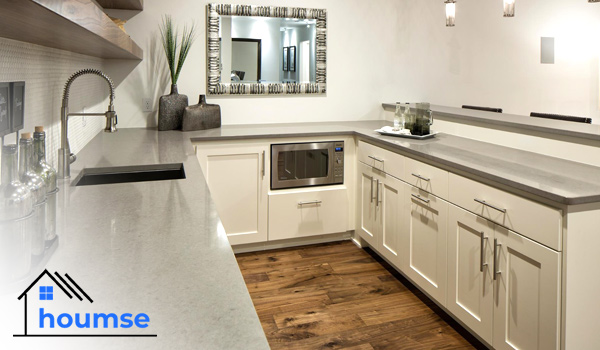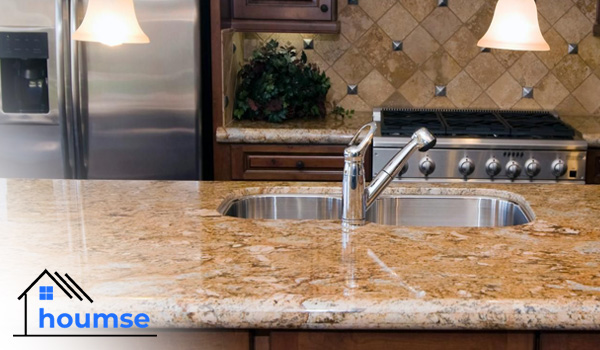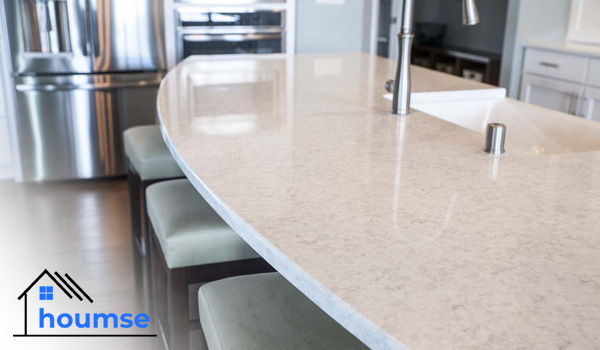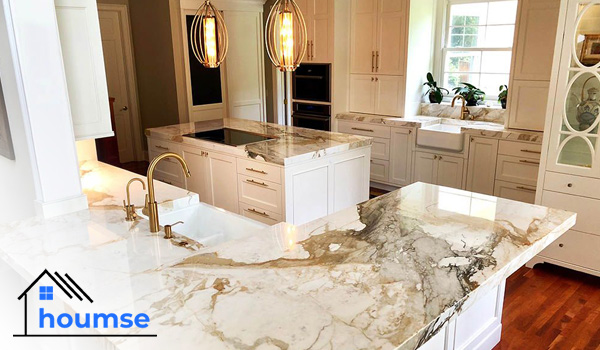Quartz vs Granite Countertops (Pros and Cons)

When comparing different kitchen countertop materials, two options shine bright: quartz and granite. Although granite is a 100 percent natural stone and quartz is 95 percent ground natural quartz and 5 percent polymer resins, they are both advertised as one of the best materials offering everything you might want from a counter.
Is this really true? Apart from quartz vs granite countertops price, which is easy to find and review, what do consumer reports say about these options? Which one of them is going to make your ideal countertop? Scroll through to find out the difference between quartz and granite in every aspect.
Quartz vs Granite Countertops Price
Let us answer the important question first: is quartz or granite more expensive or is it the opposite? Unfortunately, there is not a simple answer for granite vs quartz price. Both alternatives are considered expensive countertops.
Granite, depending on the style and the edging treatment can cost from $80 to $180 per square foot, installed. Which can be about $2,000 to $4,000 for a project. You can reduce the costs by purchasing the material from a wholesaler and doing some preliminary work yourself. However, you will need a professional crew for fabrication and installation.
Quartz, however, due to its growing popularity, gradually is becoming a more economical option compared to granite. Still, granite vs quartz price does not show a drastic difference, as engineered stone price ranges from about $80 to $140 per square foot, installed. Here too you can do some of the preliminary work to save money. But you will need the help of a professional to install this heavy material.
Since both materials are sourced overseas and container-shipped across oceans, petroleum price, tariffs, and other factors also affect granite or quartz pricing.
Quartz vs Granite Composition
Now that the difference between quartz and granite prices is clear, let us discuss other features.
Granite, as mentioned earlier, is a purely natural stone directly mined from stone quarries. It is cut into thin slabs, polished, and fabricated into different products like countertops.
Quartz, on the other hand, is an engineered stone fabricated mainly from natural quartz (93% to 95%), some minerals, colorants, and resin to hold them together. Instead of being mined, cut, and polished, this product is made using ground-up stone formed into slabs.

Quartz Versus Granite Appearance
The way granite or quartz looks can be the sole reason for most buyers to make a definitive choice. If you are not totally sure, maybe realizing quartz vs granite countertops regarding their appearance helps you.
Granite has an undeniable advantage here and that is the fact that every slab has its own unique pattern and color. So, you will have a countertop that at the very least is slightly different than any other granite countertop in the world! However, keep in mind that you may need to spend more time finding the right slab that matches your decor’s color scheme.
Quartz, being an engineered product, does not have the same advantage. Although offering various colors and patterns (including natural stone), they are somewhat uniform in appearance. Instead, the selection process with quartz is much easier.
When it comes to appearance, choosing granite or quartz heavily depends on your personal taste. To introduce the authentic look of the natural stone, granite is a better choice. And if choosing a slab from infinite options sounds more appealing, you may want to go for quartz.
Quartz vs Granite Countertops Heat Resistance and Durability
Granite is a durable material as one would guess, showing resistance to heat and other kitchen elements. However, it is not a winner when comparing the quartz versus granite’s hardiness. Due to its porous nature, granite will be stained if spilled liquids are not dried and cleaned properly at the right time. Additionally, it is prone to cracking and can be damaged upon receiving high-impact blows.
Quartz, thanks to having resin and not being porous, is harder and more durable. Some even consider it indestructible when putting quartz vs granite countertops. There is one thing to consider though: Quartz can be damaged by excessive heat. So be careful with cooking pans and always use heating pads.

Granite vs Quartz Maintenance
Considering the difference between quartz and granite regarding their composition, maintaining them is not the same. Let us see if granite or quartz offers more convenient care.
Granite, again, because it is relatively porous, requires sealing after installation once a year. In addition, it is recommended to clean it daily with soap and water or a mild household cleaner. Keep in mind that some oils and acids can stain the countertop.
Quartz, on the other hand, does not require sealing thanks to the resins that provide slabs that are uniform throughout. When pondering over the question of granite or quartz, it means resistance against stain and even bacteria next to cracks. It is still recommended to use soap and water to clean spills, but that is about correct maintenance and not necessarily ensuring the longevity of an investment.
Quartz Versus Granite Eco-Friendliness
Kudos if the difference between quartz and granite for you goes further than common questions like granite vs quartz price.
Granite has a long journey to end up as a countertop in your kitchen, consuming a considerable amount of energy from mining to transporting. If you are going to purchase a natural stone countertop, consider indigenous stone or visit salvage shops to find pieces that can be cut to fit your needs.
Quartz is more environmentally friendly in that aspect. As an engineered product, it does not have to be imported from Italy for example. It can be regionally manufactured by local fabricators, reducing transportation costs. Although, it still needs carbon-based fuel and unnatural resin chemicals!
While deciding if granite or quartz is better for you, you may come across some information about radon emissions from granite countertops. However, according to recent studies and EPA, it is extremely unlikely that radiation from these countertops causes any problem.

Difference Between Quartz and Granite Lifespan
Granite countertops have an estimated lifespan of 100 years, if cared for and maintained well of course. This beautiful stone lasts for millions of years in its natural form. But as a kitchen countertop, it does not last forever and loses its practical usability someday. However, it lasts much longer than all of its surroundings, especially when maintained carefully.
Quartz, as mentioned above, is nearly impossible to destroy. When visiting different stores, you will notice that even some manufacturers offer warranties for life.
Installation and DIY Friendliness
Granite or quartz, both call for professional installation even for simple projects. These materials are notably hefty, bulky, and not suitable for DIY installation unless we are talking about very small bathroom vanity countertops and experienced DIYers.
In any case, keep in mind that granite or quartz needs challenging and precise cuts that are only achieved by special equipment and comprehensive training, especially when it is required to create invisible lines for seaming multiple sections.

Quartz vs Granite Countertops Repair
Quartz, while it is a tough product and its manufacturing methods ensure maximum uniformity, may chip, scratch, or crack in rare events. Professionals can fix such damages by buffing the scratches out, using color-matching resins to repair chips, and using special epoxy to repair minor cracks.
Granite is tough to damage as well, but its porous nature makes it somewhat vulnerable to stains. As mentioned in earlier parts, it can be removed with suitable cleansers. Repair methods for chips, scratches, or cracks are like quartz.
Similar to installation, DIY repair is not recommended for granite or quartz as well.
Resale and Real Estate Value
Granite offers better resale value, although both materials are high-end. However, note that we are talking about the value of the countertop itself and not the installation cost.
Quartz does not perform as well as granite here. Nevertheless, the idea of having an easy-to-care material may appeal to many buyers.
Granite Or Quartz, What Is Your Choice?
Considering all the pros and cons of these materials, what would be your choice? Granite or quartz? Share your opinion with us. Also, is there a factor left out when comparing quartz vs granite countertops, let us know in the comments.
- In this post:
- Quartz vs Granite Countertops Price
- Quartz vs Granite Composition
- Quartz Versus Granite Appearance
- Quartz vs Granite Countertops Heat Resistance and Durability
- Granite vs Quartz Maintenance
- Quartz Versus Granite Eco-Friendliness
- Difference Between Quartz and Granite Lifespan
- Installation and DIY Friendliness
- Quartz vs Granite Countertops Repair
- Resale and Real Estate Value
- Granite Or Quartz, What Is Your Choice?



